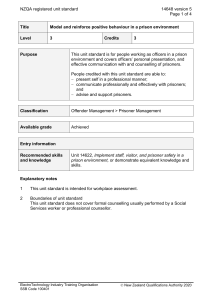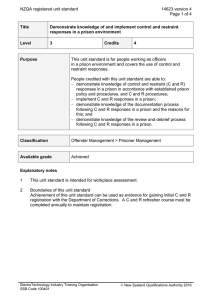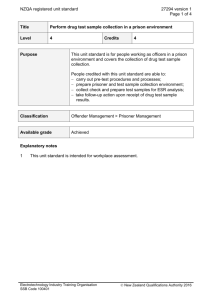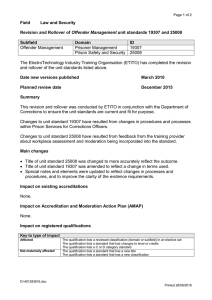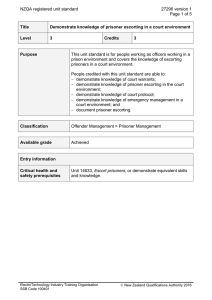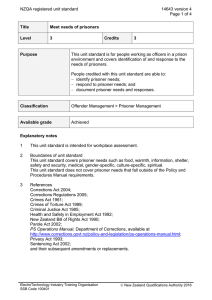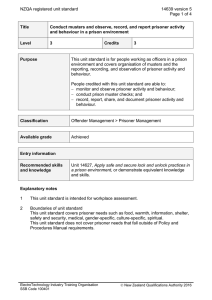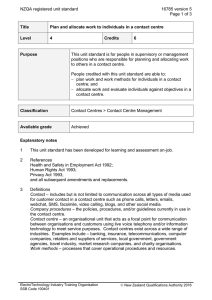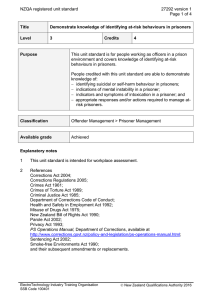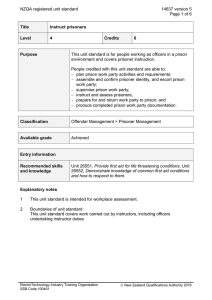Document 15234968
advertisement
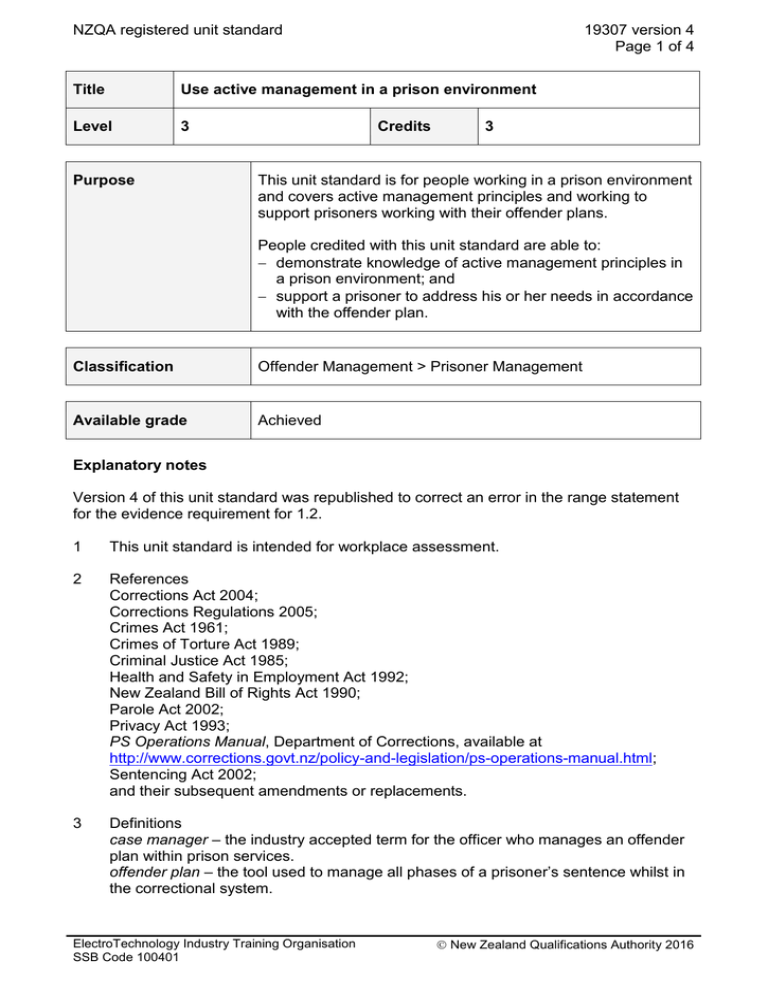
NZQA registered unit standard 19307 version 4 Page 1 of 4 Title Use active management in a prison environment Level 3 Purpose Credits 3 This unit standard is for people working in a prison environment and covers active management principles and working to support prisoners working with their offender plans. People credited with this unit standard are able to: demonstrate knowledge of active management principles in a prison environment; and support a prisoner to address his or her needs in accordance with the offender plan. Classification Offender Management > Prisoner Management Available grade Achieved Explanatory notes Version 4 of this unit standard was republished to correct an error in the range statement for the evidence requirement for 1.2. 1 This unit standard is intended for workplace assessment. 2 References Corrections Act 2004; Corrections Regulations 2005; Crimes Act 1961; Crimes of Torture Act 1989; Criminal Justice Act 1985; Health and Safety in Employment Act 1992; New Zealand Bill of Rights Act 1990; Parole Act 2002; Privacy Act 1993; PS Operations Manual, Department of Corrections, available at http://www.corrections.govt.nz/policy-and-legislation/ps-operations-manual.html; Sentencing Act 2002; and their subsequent amendments or replacements. 3 Definitions case manager – the industry accepted term for the officer who manages an offender plan within prison services. offender plan – the tool used to manage all phases of a prisoner’s sentence whilst in the correctional system. ElectroTechnology Industry Training Organisation SSB Code 100401 New Zealand Qualifications Authority 2016 NZQA registered unit standard 4 19307 version 4 Page 2 of 4 Assessment range a Performance of the outcomes of this unit standard must meet all the principles of behaviour and criteria as detailed in the Prison Services Operations Manual (PSOM), Department of Corrections (available at http://www.corrections.govt.nz/policy-and-legislation/ps-operations-manual.html), the Department of Corrections Code of Conduct, other documented national policies and procedures, and prison-specific procedures. b The range statements in this unit standard must be applied according to prisonspecific equipment, procedures, and processes. Outcomes and evidence requirements Outcome 1 Demonstrate knowledge of active management principles in a prison environment. Evidence requirements 1.1 Define active management in accordance with the Prison Services Offender Management Manual. 1.2 Explain the component parts of active management and how they apply to the role of an officer. Range 1.3 knowledge, communication, responsiveness, exerting influence. Explain pro-social modelling and how it is demonstrated in accordance with the Prison Services Offender Management Manual. Outcome 2 Support prisoner to address his or her needs in accordance with their offender plan. Evidence requirements 2.1 Maintain a positive relationship with the prisoner through regular informal meetings to promote behaviour change, and provide feedback and guidance in support of offender plan activities. 2.2 Respond to prisoner enquiries about their offender plan clearly, concisely, in a way that is consistent with the plan and relevant legislation, and check understanding with the prisoner. 2.3 Respond to prisoner incidents, processes and circumstances in a timely, targeted and effective way to ensure progress towards achieving planned activities. ElectroTechnology Industry Training Organisation SSB Code 100401 New Zealand Qualifications Authority 2016 NZQA registered unit standard 2.4 Identify obstacles to progress and propose and implement appropriate problemsolving strategies. strategies may include but are not limited to – decision grid, informal meetings; evidence of two is required. Range 2.5 19307 version 4 Page 3 of 4 Provide feedback on a prisoner to his or her case manager using relevant documentation. Range activity progress form, file notes. Planned review date 31 December 2016 Status information and last date for assessment for superseded versions Process Version Date Last Date for Assessment Registration 1 28 November 2002 30 June 2012 Review 2 25 July 2006 30 June 2012 Rollover and Revision 3 19 March 2010 30 June 2012 Review 4 20 May 2011 N/A Republished 4 18 August 2011 N/A Consent and Moderation Requirements (CMR) reference 0003 This CMR can be accessed at http://www.nzqa.govt.nz/framework/search/index.do. Please note Providers must be granted consent to assess against standards (accredited) by NZQA, before they can report credits from assessment against unit standards or deliver courses of study leading to that assessment. Industry Training Organisations must be granted consent to assess against standards by NZQA before they can register credits from assessment against unit standards. Providers and Industry Training Organisations, which have been granted consent and which are assessing against unit standards must engage with the moderation system that applies to those standards. Requirements for consent to assess and an outline of the moderation system that applies to this standard are outlined in the Consent and Moderation Requirements (CMRs). The CMR also includes useful information about special requirements for organisations wishing to develop education and training programmes, such as minimum qualifications for tutors and assessors, and special resource requirements. ElectroTechnology Industry Training Organisation SSB Code 100401 New Zealand Qualifications Authority 2016 NZQA registered unit standard 19307 version 4 Page 4 of 4 Comments on this unit standard Please contact the ElectroTechnology Industry Training Organisation (ETITO) reviewcomments@etito.co.nz if you wish to suggest changes to the content of this unit standard. ElectroTechnology Industry Training Organisation SSB Code 100401 New Zealand Qualifications Authority 2016
